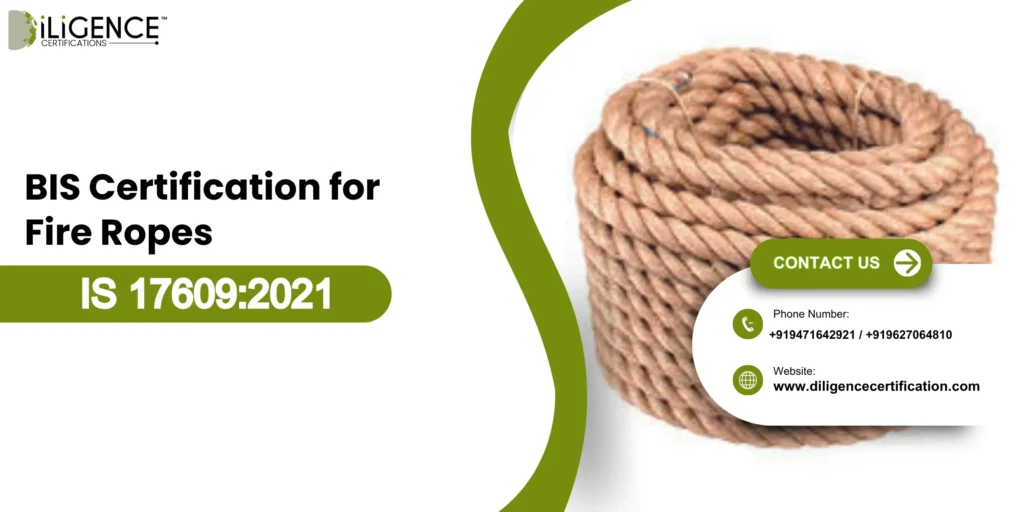- BIS certification For fibre ropes comply with quality and safety qualifications specified in IS 17609:2021.
- The ISI mark is a guarantee of trust for consumers and buyers, meaning products have been validated as credible.
- Manufacturers are required to follow a defined process consisting of application, testing, inspection and approval.
- Certification provides manufacturers with legal compliance, market advantage and export opportunities.
- Only registered manufacturers with proper facilities and quality systems are eligible for BIS certification.
Introduction
A rope company in Gujarat once lost a big order because their fibre ropes failed a quality test. The buyer said they only accept BIS-certified ropes. That minor issue cost the company a significant amount of money and provided them with a clear lesson – that BIS certification is applicable to every manufacturer of rope in India in order to be allowed to manufacture.
If you manufacture or sell fibre ropes using polyester and polyolefin dual fibres you need to comply with the Indian Standard IS 17609:2021.
This certification makes sure your ropes are safe, strong, and long-lasting.
What is IS 17609:2021?
IS 17609:2021 is an Indian standard document issued by the Bureau of Indian Standards (BIS) which specifies the general requirements and quality standards for the manufacture of fiber ropes made using polyester and polyolefin dual fibers.
It lays down the specification and strength of ropes, as well as performance testing.
This standard guarantees that all ropes manufactured to this standard are safe, strong and durable in industrial, marine, or heavy lifting applications.
Why BIS Certification is Mandatory for Fibre Ropes
The BIS certification is mandatory for fibre ropes manufactured with polyester and polyolefin dual fibres, to ensure that every fibre rope sold in India is acceptable under the government’s quality and safety regulations.
These ropes are used in important sectors, such as construction and affiliated industries, shipping, transport etc. where strength and reliability are very important. Any failure or mishap in fibre ropes made with poor quality fibre can expose workers to accidents, loss of property, and injuries.
That is why the Government of India has mandated through Bureau of Indian Standards (BIS) that all manufacturers attain ISI certification within IS 17609:2021 prior to selling their product.
Understanding the ISI Mark for Fibre Ropes
The ISI Mark on a rope serves as visible proof that it complies with the IS 17609:2021 standard.
It signifies:
- Consistent manufacturing quality
- Controlled production under BIS inspection
- Adherence to safety and performance norms
Every manufacturer must apply for a BIS licence to affix this ISI mark on their product before it enters the Indian market.
Importance and Benefits of BIS Certification
| S.No | Importance / Benefit | Description |
| 1 | Ensures Product Quality | Ropes are made as per IS 17609:2021 and are strong and reliable. |
| 2 | Customer Trust | ISI mark proves product is safe and good quality. |
| 3 | Legal Requirement | Mandatory in India; selling without it is illegal. |
| 4 | Safety Assurance | Certified ropes reduce accidents or injuries. |
| 5 | Market Advantage | Helps get more sales and tenders.Helps get more sales and tenders. |
| 6 | Avoids Penalty | Prevents fines and rejection. |
| 7 | Improves Brand Image | Shows professionalism and quality commitment. |
| 8 | Supports Export | Accepted in international markets. |
| 9 | Customer Satisfaction | Ensures happy and repeat customers. |
| 10 | Supports National Standards | Promotes Make in India quality products. |
Eligibility Criteria for BIS Certification
To apply for BIS Certification for fibre ropes under IS 17609:2021, a manufacturer or company must meet the following criteria:
| S.No | Eligibility Requirement | Details |
| 1 | Registered Business | The applicant must be a legally registered company, LLP, partnership, or proprietorship. |
| 2 | Manufacturing Facility | Must have a functional factory or production unit to produce fibre ropes. |
| 3 | Quality Control System | Should maintain quality control records, testing equipment, and proper documentation. |
| 4 | Product Compliance | The fibre ropes must be made from polyester and polyolefin dual fibres and comply with IS 17609:2021 specifications. |
| 5 | Trained Staff | Factory should have trained personnel for production and quality testing. |
| 6 | Willingness for Inspection | Must allow BIS officers to inspect the factory and production process. |
| 7 | Financial Capability | Should be able to pay BIS fees and bear testing/inspection costs. |
Step-by-Step Process for BIS Certification for Fibre Ropes
Step 1: Check Product Standard
First, check if your product comes under the standard IS 17609:2021 (Fibre ropes made from polyester and polyolefin dual fibres).
Only products matching this standard can apply for BIS certification.
Step 2: Apply Online on BIS Portal
Go to the BIS Manakonline portal (https://www.manakonline.in) and create your account.
Fill out the application form and upload all required documents like:
- Factory license
- Test report (if available)
- Product details
- Manufacturing process
Step 3: Product Testing in BIS-Approved Lab
Send a sample of your fibre rope to a BIS-recognized laboratory for testing.
The lab checks if your product meets all quality points mentioned in IS 17609:2021.
Step 4: Factory Inspection by BIS Officer
A BIS officer will visit your factory to check:
- The manufacturing setup
- Quality control system
- Product testing equipment
- Production process
Step 5: Test Report and Verification
The BIS officer verifies the lab test reports and inspection details.
If everything is correct and your product passes all tests, the application moves to the approval stage.
Step 6: Grant of BIS License
After successful verification, BIS issues a license to your company.
You can now use the ISI Mark on your fibre rope products — which shows that your ropes are tested and certified as per IS 17609:2021.
Step 7: Renewal of BIS Certification
The BIS license is valid for 2 years (can vary).
You must renew it before expiry by submitting updated documents and fees.

Documents Required for BIS Certification
| Category | Required Documents |
| Company Proof | Incorporation Certificate, GST, MSME/Udyam |
| Factory Details | Layout, Machinery List, Production Flow Chart |
| Quality System | Internal QC Records, Calibration Certificates |
| Product Testing | Lab Report (IS 17609:2021 compliance) |
| Technical Details | Product specifications, raw material data |
Validity and Renewal of BIS Licence
| Point | Details |
| Initial Validity | The BIS licence is usually valid for 2 years from the date of issue. |
| Renewal Period | It can be renewed for a further period of up to 5 years at a time. |
| Renewal Time | The manufacturer should apply for renewal at least 3 months before the licence expiry date. |
| Requirements for Renewal | 1. Updated product test reports2. Proof of consistent production3. BIS licence fee and renewal charges |
| Inspection During Renewal | BIS may conduct another factory inspection to confirm that the product still meets IS 17609:2021 standards. |
| If Renewal is Delayed | Late renewal can lead to temporary suspension or cancellation of the licence. |
| After Renewal | Once approved, the manufacturer can continue using the ISI mark on the product. |
Common Challenges in BIS Certification for Fibre Ropes (IS 17609:2021)
- Incomplete Documentation – Missing factory layouts, quality records, or product details can delay or reject your application.
- Product Non-Compliance – Fibre ropes that do not meet IS 17609:2021 standards may fail lab tests, requiring rework or modifications.
- Factory Inspection Issues – Poorly maintained facilities or lack of proper quality control systems can lead to inspection rejection.
- Delays in Lab Testing – Improperly prepared samples can cause longer waiting times for test results in BIS-approved labs.
- Renewal Challenges – Failing to renew on time or missing updated documents can result in temporary suspension of the BIS licence.
- Consultant Misguidance – Using inexperienced consultants may cause errors in application or missing steps, delaying certification.
- Financial Constraints – Small manufacturers may find it difficult to manage costs for testing, inspection, and licensing.
- Understanding Standards – Some manufacturers misinterpret technical requirements of IS 17609:2021, leading to non-compliance issues.
Cost of BIS Certification for Fibre Ropes
The total cost of BIS certification depends on several factors, such as your factory size, production capacity, and number of products. The main components are:
| S.No | Cost Component | Details |
| 1 | Application Fee | Paid while submitting the application online. Covers processing of documents. |
| 2 | Product Testing Fee | Cost of testing fibre rope samples in a BIS-approved lab. Varies depending on tests required. |
| 3 | Factory Inspection Fee | BIS may charge for visiting and inspecting your manufacturing facility. |
| 4 | License Fee | Fee for granting the BIS licence, usually based on production capacity. |
| 5 | Renewal Fee | Fee for renewing the licence, typically every 2 years. |
Why Choose Diligence Certification for BIS Certification?
- Expert Assistance: Diligence Certification has years of experience in getting BIS certification for manufacturers of products like polyester, polyolefin dual fibers, fibre ropes etc. We will take you through the process step-by-step, and help you avoid common pitfalls.
- Faster Turnaround: Our team will help facilitate the application, documentation turn and testing of your product so you can get the ISI mark without lengthy waits.
- Complete Document Assistance: We will prepare, and prepare you for the minimal documentation such as factory details, prior test report review, quality control records to qualification and ensure you are prepared to provide such documentation as required by BIS.
- Compliance Review: We will review your documents to ensure your product is compliant with IS 17609:2021 wherever possible and reduce the potential for rejection or legal action.
- Manufacturer Preferred: Many rope manufacturers or exporters within India’s trust Diligence Certification to assist them in developing credibility and trust in the market.
- Post Certification Services: Even after obtaining the BIS license, we will continue to support and assist with renewal, inspections, or compliance audit.
Conclusion
BIS Certification for Fibre Ropes (IS 17609:2021), assures your customers of quality, safety and adherance to the Law. The ISI mark confers compliance with Indian standards, contributes to customer trust, and expands your reach to business and export markets.
By using the step-by-step approach to certification, carrying out proper documentation, ensuring compliance of your factory facilities, your certification will be seamless.
Engaging with a Certification Agency such as Diligence Certification will simplify your path to certification, save you time and ensure your fibre ropes are compliant with all BIS specifications.
Frequently Asked Questions
What is IS 17609:2021?
It represents an Indian Standard regarding the specifications of fibre ropes consisting of polyester and polyolefin dual fibres including, strength, performance and safety values.
Is BIS certification required for fibre ropes?
Yes, in accordance with the Quality Control Order, manufacturers need BIS Certification before selling or distributing these products in India.
What is the BIS licence validity?
The licence is valid for two years and can be renewed if it is compliant with BIS norms.
Can a foreign manufacturer apply for BIS certification?
Yes, foreign manufacturers can apply for the ISI mark under the FMCS (Foreign Manufacturers Certification Scheme).
What tests are included times IS 17609:2021?
Tests include tensile strength, elongation, having deformation under load, water absorption, and abrasion resistance.
How long does it take to get a BIS license?
It generally takes 30-45 working days depending on the time it takes for lab testing and documentation verification.
What if the product did not meet the BIS test requirements?
The manufacturer has to correct the non-compliance, retest and reapply.
Can it revoke a licence?
Yes, BIS can suspend or cancel a licence if a product doe not meet IS standard or fails market surveillance.
Who can help with BIS Certification documentation?
Accredited consultants like Diligence Certification can provide complete support, from your initial application to your final approval.
What are the penalties for selling non-certified fibre ropes?
Selling non-certified products is an offence against the BIS Act and is subject to fines and seizure of products.








 BIS Certification
BIS Certification
 CDSCO
CDSCO
 CPCB
CPCB
 LMPC
LMPC
 WPC Approval
WPC Approval
 Global Approvals
Global Approvals
 TEC
TEC
 ARAI
ARAI
 BEE
BEE
 ISO Certification
ISO Certification
 Drone Registration
Drone Registration
 NOC For Steel
NOC For Steel



















 Business Registration
Business Registration















 Legal Services
Legal Services
 Trademark Registration
Trademark Registration
 Copyright Registration
Copyright Registration
 Patent Registration
Patent Registration















































